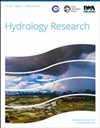Drought mitigation operation of water conservancy projects under severe droughts
IF 2.4
4区 环境科学与生态学
Q2 Environmental Science
引用次数: 0
Abstract
Severe droughts typically last for extended periods and result in substantial water shortages, posing challenges for water conservancy projects. This study proposed a framework for coordinating drought mitigation operations across projects of various scales. First, the regulation and drought mitigation capacities of each project were analyzed, and thus critical reservoirs was identified. Subsequently, a joint regulation model for water supply, prioritizing projects based on their regulatory capacity from weak to strong, was established. An optimization model is then developed to determine the drought-limited levels for critical reservoirs, aiming to minimize water shortages. This model facilitates temporal coordination of water resources to prevent severe water shortages with frequent mild water shortages. Results in the Chuxionglucheng District of Chuxiong, Yunnan Province, during the severe drought period from 2009 to 2013, demonstrates significant reductions in water shortage. Specifically, the maximum shortage ratio decreased from 59 to 45% for agriculture and from 52 to 8% for industry. Moreover, emergency measures for drought mitigation were compared and recommend for regions with weak projects regulation. Overall, this framework offers a systematic approach to enhancing drought resilience across diverse water conservancy projects in severe drought conditions.严重干旱下的水利工程抗旱运行
严重干旱通常会持续很长时间,并导致严重缺水,给水利工程带来挑战。本研究提出了一个协调不同规模工程抗旱行动的框架。首先,分析了各工程的调节和抗旱能力,从而确定了关键水库。随后,建立了供水联合调节模型,根据调节能力从弱到强排列项目的优先次序。然后建立了一个优化模型,以确定关键水库的干旱限制水位,从而最大限度地减少水资源短缺。该模型有助于水资源的时间协调,以防止严重缺水和频繁的轻度缺水。云南省楚雄州楚雄潞城区在 2009 年至 2013 年严重干旱期间的研究结果表明,缺水率显著降低。具体而言,农业最大缺水率从 59%降至 45%,工业最大缺水率从 52%降至 8%。此外,还对项目监管薄弱地区的抗旱应急措施进行了比较和建议。总之,该框架为在严重干旱条件下提高不同水利工程的抗旱能力提供了系统方法。
本文章由计算机程序翻译,如有差异,请以英文原文为准。
求助全文
约1分钟内获得全文
求助全文
来源期刊

Hydrology Research
Environmental Science-Water Science and Technology
CiteScore
5.30
自引率
7.40%
发文量
70
审稿时长
17 weeks
期刊介绍:
Hydrology Research provides international coverage on all aspects of hydrology in its widest sense, and welcomes the submission of papers from across the subject. While emphasis is placed on studies of the hydrological cycle, the Journal also covers the physics and chemistry of water. Hydrology Research is intended to be a link between basic hydrological research and the practical application of scientific results within the broad field of water management.
 求助内容:
求助内容: 应助结果提醒方式:
应助结果提醒方式:


